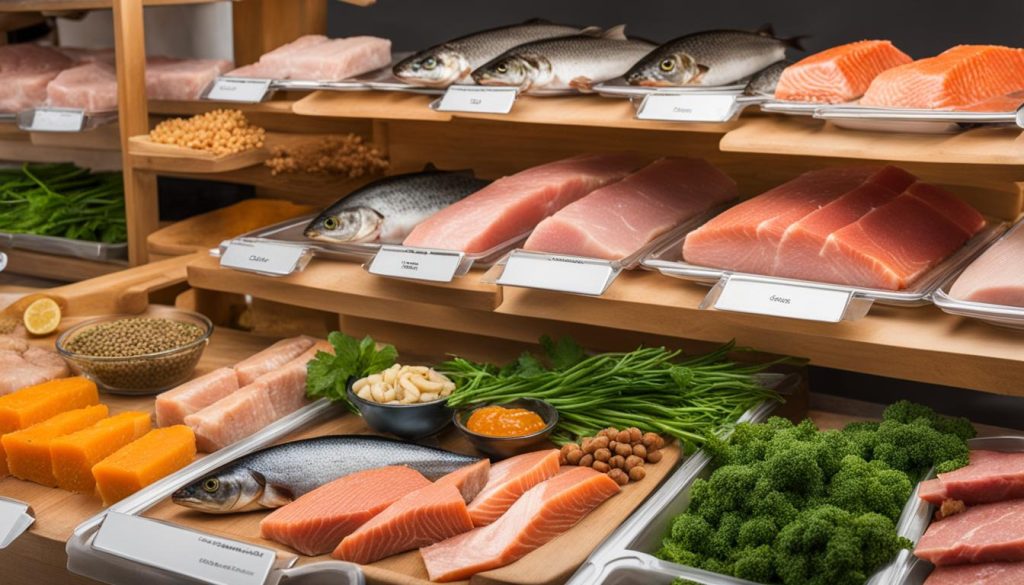As a cat owner, you may have wondered whether it’s safe to feed salmon to your feline friend. After all, salmon is known for being a nutritious and delicious fish that humans enjoy. But can cats eat salmon too? Let’s explore the topic and find out.
Firstly, it’s important to note that cats can indeed eat salmon. In fact, salmon can provide several health benefits for your furry companion. It is a good source of protein and contains essential nutrients such as omega-3 fatty acids, vitamin B12, and vitamin B6.
However, while salmon can be part of a cat’s diet, it should not make up the majority of their meals. Feeding cats salmon as an occasional treat or supplement to their regular balanced diet is recommended. Moderation is key.
When it comes to preparing salmon for cats, it’s crucial to avoid giving them raw salmon. Raw salmon can contain harmful parasites and bacteria that can pose health risks to cats. Instead, cooked salmon without seasoning or added oils is the safest option. Cooked salmon retains its nutritional benefits while minimizing the risk of infections.
It’s important to introduce salmon gradually into your cat’s diet, especially if they have never tried it before. Some cats may have allergies or sensitivities to fish, including salmon. Watch for any adverse reactions and consult with your veterinarian if you notice any concerning symptoms.
Remember, although cats can enjoy the occasional serving of salmon, it should not replace their regular cat food. Salmon should only be a small part of their overall diet.
Can Cats Eat Salmon? Yes, they can. Don’t forget to remove the bones!
- Salmon can be safely consumed by cats in moderation and when properly prepared.
- It is a good source of protein and contains beneficial nutrients like omega-3 fatty acids, vitamin B12, and vitamin B6.
- Avoid feeding cats raw salmon to prevent potential parasites and bacteria.
- Introduce salmon to your cat’s diet slowly and watch for any allergies or sensitivities.
- Salmon should not replace your cat’s regular balanced diet and should only be a small part of their overall meals.
Can Cats Eat Salmon Skin? Important Facts & Health Guidelines
Many cat owners wonder whether it’s safe for their feline friends to indulge in salmon skin. Let’s dive into the topic and uncover important facts and health guidelines regarding this matter.
Salmon skin, when properly prepared and cooked, can indeed be safe for cats to eat. It contains higher levels of omega-3 and omega-6 fatty acids, which can have several health benefits for cats. These fatty acids promote healthy skin and coat, reduce inflammation, and improve joint mobility.
When preparing salmon for your feline companion, it’s crucial to remove the head, bones, and fins to minimize any potential hazards. You can cook the salmon using various methods such as poaching, roasting, or grilling. However, ensure that it’s thoroughly cooked and doesn’t contain any seasonings or added oils that could be harmful to cats.
It’s important to offer salmon skin as a special treat and in moderation, rather than a regular part of your cat’s diet. Just like with any new food, it’s essential to observe your cat for any adverse reactions or allergies. Some cats may have sensitivities to fish, including salmon skin. If you notice any unusual symptoms, it’s best to consult with a veterinarian for guidance.
To provide your cat with a well-balanced diet, it’s important to remember that salmon skin should not replace their regular cat food. It should only be an occasional addition to their meals to provide them with some extra nutrients and a delightful treat.
Now that you have a better understanding of the safety and guidelines for feeding cats salmon skin, you can make informed decisions about whether to include this treat in your furry friend’s diet.
How Much Salmon Is Okay for Cats? Portion Control and Safety Tips
When it comes to feeding cats salmon, portion control is crucial. While salmon can provide cats with beneficial nutrients, it should only make up a small portion of their overall diet. It is recommended to feed cats salmon as a treat or supplement, rather than a main meal.
A general guideline is to limit treats and extras, including salmon, to not exceed 10% of a cat’s daily calorie intake. This means that it’s important to offer salmon in small quantities and avoid overfeeding.
Additionally, it’s important to choose fresh salmon filets that are boneless and properly cooked to eliminate any potential risks, such as parasites or bacteria.

It’s also important to avoid giving cats canned salmon that contains excessive sodium or additives that can be harmful to their digestive system.
Overall, practicing portion control and following safety guidelines can ensure that cats can enjoy the benefits of salmon without any negative effects on their health.
Salmon-Based Cat Food Options: Pros and Cons
Salmon-based cat food is a popular choice for pet owners looking to incorporate the benefits of salmon into their cat’s regular diet. These specially formulated cat foods use salmon as a primary protein source to provide cats with the necessary nutrients they need.
Feeding cats salmon-based cat food offers the same advantages as feeding them fresh salmon. It provides essential omega-3 fatty acids, vitamin B12, and vitamin B6, which support their overall health and well-being. These nutrients contribute to healthy skin and coat, support the immune system, and aid in cognitive function.
Moreover, salmon-based cat food offers convenience by ensuring that cats receive a balanced and complete diet in every meal. It eliminates the need for pet owners to prepare and cook fresh salmon themselves.
However, there are a few drawbacks to consider when it comes to salmon-based cat food. Some cats may have allergies or sensitivities to salmon, so it’s important to introduce the food gradually and monitor for any adverse reactions. It’s also crucial to choose a reputable and high-quality brand to avoid excessive sodium, additives, or low-quality ingredients that might be present in some salmon-based cat foods. Consulting with a veterinarian can help in selecting the best salmon-based cat food that meets your cat’s nutritional needs.
Overall, salmon-based cat food provides a convenient way to ensure that cats receive the benefits of salmon as part of their regular diet. It offers essential nutrients and can support their overall health and well-being. However, it’s important to be mindful of potential allergies, sensitivities, and the quality of the cat food to provide the best nutrition for your feline friend.
Salmon Alternatives for Cats: Protein Options to Consider
While salmon can provide cats with beneficial nutrients, there are several alternative protein sources that can be incorporated into a cat’s diet to provide variety and ensure balanced nutrition.
Some other fish varieties, such as tuna or whitefish, can be offered in moderation as an alternative to salmon. These fish options can provide cats with similar nutritional benefits, including essential omega-3 fatty acids.
Poultry, such as chicken or turkey, is another excellent protein option for cats. These cat-friendly meats are rich in protein and can be easily cooked and offered to cats in a safe and nutritious form.
To ensure the safety and health of cats, it’s important to offer these protein alternatives in a cooked and unseasoned form. This means avoiding any added oils, spices, or condiments that may be harmful to cats.

There are also commercially available cat foods that offer a range of protein options, including salmon, tuna, chicken, and more. These convenient cat food options provide a balanced and complete diet for cats.
Incorporating variety into a cat’s diet is important to prevent food allergies or sensitivities and provide them with a diverse array of nutrients.
When introducing new protein sources, it’s essential to do so gradually and monitor cats for any adverse reactions. Slowly transitioning their diet can help ensure their digestive system adjusts properly.
By offering a variety of protein options, cat owners can incorporate alternative sources of nutrition into their cats’ diet, providing them with a balanced and varied menu that supports their overall health and well-being.
Potential Risks of Feeding Cats Salmon: Allergies, Sensitivities, and Mercury Concerns
While salmon can offer various health benefits for cats, it’s essential to be aware of the potential risks associated with feeding them this fish.
Allergies and Sensitivities: Some cats may have allergies or sensitivities to salmon. This can result in symptoms such as itchy skin, skin inflammation, excessive grooming, vomiting, diarrhea, or other digestive issues. To avoid potential complications, it’s important to introduce salmon to a cat’s diet slowly and monitor their reactions closely.
Mercury Poisoning: Mercury is a heavy metal that can be found in certain fish, including certain varieties of salmon. While the risk of mercury poisoning in cats is relatively low, it’s still crucial to exercise caution. When feeding cats salmon, opt for low-mercury fish options and practice moderation. Avoid giving cats large predator fish or large fish that are more likely to contain higher levels of mercury.
By being aware of these potential risks and taking necessary precautions, cat owners can ensure the safety and well-being of their feline companions when feeding them salmon.
Conclusion
Feeding cats salmon can be a safe and beneficial addition to their diet when done in moderation and following proper preparation methods. Salmon is rich in essential nutrients like omega-3 fatty acids, vitamin B12, and vitamin B6, which support cats’ overall health, including their skin and coat, immune system, and cognitive function.
However, it’s important to note that salmon should not replace a cat’s regular balanced meals and should only be a small part of their overall diet. Properly cooked salmon without any bones or seasonings is crucial to ensure it is safe for cats to consume.
Some cats may have allergies or sensitivities to salmon, and there is also a potential risk of mercury poisoning associated with certain types of salmon. Therefore, it’s essential to monitor cats for any adverse reactions and practice portion control when offering them the occasional serving of salmon.
As always, it’s recommended to consult with a veterinarian for personalized advice and recommendations catered to your cat’s specific dietary needs. They can provide expert guidance on incorporating salmon into your cat’s diet in a way that promotes their overall well-being.
FAQ
Can cats eat salmon?
Cats can eat salmon, but it should be consumed in moderation and prepared properly. Salmon is a good source of protein and contains beneficial nutrients, but it should not make up the majority of a cat’s diet. Feeding cats salmon as an occasional treat or supplement can provide them with some health benefits, but it should not replace their regular cat food and should only be a small part of their overall diet.
Can cats eat salmon skin?
Yes, cats can eat salmon skin as long as it’s thoroughly cooked and doesn’t contain any seasonings or added oils. Salmon skin contains higher levels of omega-3 and omega-6 fatty acids, which can benefit a cat’s skin and coat health. However, it should be offered in moderation and as a special treat, rather than a regular part of their diet. Some cats may have allergies or sensitivities to fish, including salmon skin, so it’s important to monitor them for any adverse reactions.
How much salmon can cats eat?
It is recommended to feed cats salmon as a treat or supplement, rather than a main meal. Limit treats and extras, including salmon, to not exceed 10% of a cat’s daily calorie intake. This means offering salmon in small quantities and avoiding overfeeding. It’s important to choose fresh salmon filets that are boneless and properly cooked to eliminate any potential risks, such as parasites or bacteria. Additionally, it’s important to avoid giving cats canned salmon that contains excessive sodium or additives that can be harmful to their digestive system.
Are there salmon-based cat food options?
Yes, salmon-based cat food is a popular option for pet owners looking to incorporate salmon into their cat’s diet. These cat foods are specifically formulated to provide cats with the necessary nutrients while using salmon as a primary protein source. Salmon-based cat food can offer the same health benefits as feeding cats fresh salmon and can ensure that cats receive a balanced and complete diet. It’s important to choose a reputable and high-quality salmon-based cat food brand that meets the nutritional needs of cats.
What are the alternatives to salmon for cats?
There are several alternative protein sources that can be incorporated into a cat’s diet to provide variety and ensure balanced nutrition. Some other fish varieties, such as tuna or whitefish, can be offered in moderation as a substitute for salmon. Poultry, such as chicken or turkey, is another excellent protein option for cats. It’s important to offer these protein alternatives in a cooked and unseasoned form. Additionally, there are commercially available cat foods that offer a range of protein options. It’s important to introduce new protein sources gradually and monitor for any adverse reactions.
What are the potential risks of feeding cats salmon?
While salmon can provide cats with beneficial nutrients, there are also potential risks to consider. Some cats may have allergies or sensitivities to salmon, and there is a risk of mercury poisoning associated with consuming certain types of salmon. It’s important to introduce salmon to a cat’s diet slowly and monitor for any adverse reactions. It’s recommended to choose low-mercury fish options and to avoid feeding cats large predator fish or large fish that are more likely to contain higher levels of mercury.
How should I incorporate salmon into my cat’s diet?
Feeding cats salmon can be a safe and beneficial addition to their diet when done in moderation and following proper preparation methods. Salmon can provide cats with essential nutrients and support their overall health. However, it should only be a small part of their overall diet. It’s important to properly cook salmon, remove any potential hazards, and monitor cats for any adverse reactions. Consulting with a veterinarian for personalized advice and recommendations is always recommended.






